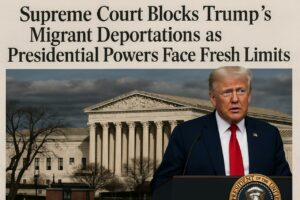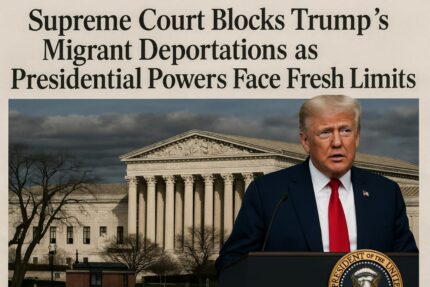Jessica Tarlov began by directly confronting the flawed accusations against Kilmar Abrego Garcia, whose deportation has sparked national outrage. She pointed out that Garcia, who had legal status approved by the Trump administration in 2019, was subjected to deportation under dubious circumstances. Tarlov revealed that the accusation linking Garcia to the MS-13 gang was based on unreliable hearsay, with no further investigation conducted to substantiate the claim. Moreover, the detective who provided the testimony was later indicted for sharing confidential information, raising serious questions about the integrity of the process.
Jessica Tarlov also highlighted that Garcia’s legal status had been verified annually with the Department of Homeland Security, yet no issues had been flagged until his arrest. Tarlov firmly stated that Garcia’s deportation, based on such questionable grounds, represents a disturbing trend in the handling of immigration cases under the Trump administration. She insisted that this situation calls into question the broader practices and motivations behind these aggressive deportation policies.
Dissecting the Discriminatory Deportation Agenda: MAGA’s Misguided Defense
Jessica Tarlov sharply challenged Greg Gutfeld’s dismissive defense of the deportation, which minimized Garcia’s plight as just a “prop” for political leverage. Tarlov countered that the facts presented in Garcia’s case were undeniable. She pointed out that more than 75% of those deported alongside Garcia had not been convicted of any crimes. This statistic debunked Gutfeld’s attempt to downplay the significance of the deportations and revealed a concerning pattern within the Trump administration’s handling of immigration cases.
Jessica Tarlov stressed that the rush to label deportees as criminals without proper investigation erodes the credibility of the entire deportation process. The MAGA defense of these policies, according to Tarlov, is grounded more in political rhetoric than in justice or fairness. Tarlov’s argument exposed a deeper flaw in the Republican narrative—one that prioritizes political expediency over basic human rights and legal due process.
Cold Hard Facts: Tarlov’s Relentless Pursuit of Justice Amidst MAGA Denial
Jessica Tarlov’s unwavering stance throughout the debate highlighted her commitment to ensuring justice for Garcia and others in similar situations. She pointed out that the legal process had failed Garcia at every step, from unfounded accusations to the lack of proper legal defense. Tarlov argued that the public is well aware of the difference between a deportation and the harsher fate of being sent to a foreign prison with no legal access, which underscores the severity of Garcia’s situation.
Jessica Tarlov also emphasized that this case was emblematic of a larger issue under the Trump administration, where deportations were often carried out without consideration for the law or fairness. Tarlov’s passionate defense of Garcia’s rights resonated with those who believe that the government should be held accountable for violating legal norms. Her remarks urged the American public to question whether such deportations, based on questionable grounds, truly reflect American values.
The Power of Public Outrage: How a U.S. Senator’s Involvement Shook the Status Quo
Jessica Tarlov noted that public outrage over Garcia’s deportation had reached a tipping point, with significant pressure now being placed on the Trump administration. She pointed to the involvement of a U.S. senator in advocating for Garcia’s case, signaling a shift in how the political establishment was beginning to engage with these issues. Tarlov argued that this heightened scrutiny was essential in holding officials accountable for deportations carried out under dubious circumstances.
Jessica Tarlov made it clear that the growing public concern had led to real consequences, including changes in the discourse surrounding immigration policies. The senator’s intervention was indicative of how political and public pressure could lead to tangible shifts in policy, especially when cases like Garcia’s attract widespread attention. Tarlov’s assertion pointed to a broader desire for reform within the immigration system, as more people demanded a fairer, more transparent process.
A Supreme Court Ruling and the 4th Circuit Opinion: Legal Precedents in Play
Jessica Tarlov underscored the significance of legal precedents in challenging Garcia’s deportation, emphasizing that the Supreme Court’s ruling had made it clear that Garcia’s return must be facilitated. Tarlov pointed to the ruling as a major legal victory, asserting that it was not just a matter of public opinion but one of legal clarity. She also referenced a key opinion from the 4th Circuit Court of Appeals, written by a Reagan-appointed judge, which reinforced the legitimacy of Garcia’s case. These rulings represent a crucial part of the legal fight to reverse unjust deportations.
Jessica Tarlov’s arguments served to remind the public that legal institutions are still capable of pushing back against unjust actions, despite political pressure. The backing of such high-profile legal authorities reinforces the idea that justice should not be swayed by political agendas. Her sharp focus on these legal rulings aimed to draw attention to the broader implications of Garcia’s case, calling for a reassessment of immigration policies that disregard constitutional rights.
A Pattern of Disregard for Human Rights: The Dangers of Politicizing Immigration
Jessica Tarlov argued that the increasing politicization of immigration, seen most clearly in the treatment of Garcia, represents a dangerous trend that undermines the fundamental rights of individuals. She pointed out that the issue is no longer about legal violations but about using people as political pawns, which compromises the integrity of the legal system. Tarlov’s remarks highlighted how political narratives often take precedence over justice, putting vulnerable individuals at risk of being treated unfairly under the law.
Jessica Tarlov’s criticism of the current approach to immigration revealed the growing dangers of a system that prioritizes political expediency over human rights. She cautioned that without a return to fair and just practices, the American immigration system could continue down a path of widespread violations. Her call for reform echoed the need for a system that ensures equal treatment under the law, free from political interference, and that respects the rights of every individual, regardless of their background.














